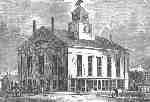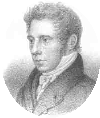CHAPTER XXIV.
Page 2
"Voted on motion of Mr. Bell, That an an [sic] act to establish a system of Police in the town of Portsmouth, and for other purposes, passed June 28th, 1823, and "an act, entitled an act in addition to an act entitled an act to establish a system of Police for the town of Portsmouth, and for other purposes, passed June, 23d, 1823," passed July 1st 1831, be adopted in the town of Manchester."The board of Fire-wards organized forthwith, and agreeably to the vote above, purchased an engine, and apparatus for the same. This was the first step towards our present efficient Fire Department. Prior to this, there had been an engine in the Stark yard; but it was owned by that corporation, and this one now purchased, Merrimack, No. 1. was the first engine owned by the town. As early as 1818, there was a fire engine in Piscataquog, now a part of the city, but at the period treated of, a part of Bedford. This engine was obtained through the influence of Isaac Riddle, Esq., and the company having charge of it, was incorporated by a special act of the Legislature.
"Voted on motion of Mr. Bell, that "an act, entitled an act, defining the powers and duties of fire-wards and other persons in certain cases," passed December 16th, 1828, and "an act, entitled an act, in addition to an act, defining the powers and duties of fire-wards, and other persons in certain cases, passed December 16th, 1828," passed July 3d, 1830, be adopted and in force in the town of Manchester."
Provided however, that such inhabitants of said town of Manchester, as live remote from the compact part or said town, that is to say, more than one mile form the corner of Amherst and Elm streets, shall be exempted from the operation of the tenth section of said first mentioned act.
"Voted that the inhabitants of the New Village have the privilege of nominating Fire-wards and Health officers."
"Chose accordingly
Amory Warren.
Hiram Brown,
David A. Bunton,
Henry S. Whitney,
John H. Maynard,
William P. Farmer,
Timothy J. Carter,
James Wallace,
Mace Moulton,
George W. Tilden,
Issac N. Ford,Fire-Wards."
"Voted, to choose a board of Health officers, to consist of three in number."
Chose accordingly,
George B. Swift,
Zaccheus Colburn,
John D. Kimball,Health Officers."
"Voted on motion of Mr. Bell, to discontinue the Public Highway leading from the Amoskeag Bridge towards Manchester Meeting House, Beginning at said Bridge, and extending to the point where Manchester Street intersects the same, Provided that the Court of Common Pleas shall consent thereto, if such consent is by law necessary."
"Voted that the public highway leading from said Amoskeag Bridge to the store in said Manchester, lately occupied by William P. Farmer, be discontinued, Provided that the Court Common Pleas shall consent thereto, if such consent is by law necessary."1
"Voted on said motion of Mr. Bell, to discontinue the public highway leading from the house now occupied by David A. Bunton, near Amoskeag Falls to the Stark house so called, Provided that the Court of Common Pleas shall consent, if such consent is necessary."2
Also on motion of Mr. Bell,
"Voted to discontinue the road leading from said Amoskeag Bridge to the Barrett house, so called, beginning at the north line of the Phillip Stevens farm, and extending to the point below the Stark Mills, where Canal street intersects the same, Provided that the Court of Common Pleas shall consent thereto, if such consent is by law necessary.3
"Voted on motion of Mr. Bell, that the Selectmen & Fire-wards be authorized to borrow not exceeding one thousand dollars, to purchase engines and apparatus for extinguishing fires, provided the same can be obtained on reasonable terms, and on extended credit."
"Voted that the Selectmen be authorized to borrow one thousand dollars, for the purpose of building the remainder of the Candia road, and repairing that part already built."
"Voted to postpone the choice of Selectmen until constables be chosen."They then made choice of thirty constables as follows, viz:
James McQuestion, J. L. Bradford, David Young, William P. Farmer, Mace Moulton, Matthew Kennedy, Walter French, John H. Copp, Levi Sargent, Adam Gilmore, Jonathan R. Cochran, Isaac C. Flanders, Joseph B. Hall, Jr., Alonzo Boyce, Nehemiah Chase, Taylor L. Southwick, Barton Munsey, Geo. W. Tilden, Josiah Stowell, Thomas Gamble, Jona C. Furbish, E. W. Harrington, Hiram Brown, Alonzo Smith, Reuben Kimball, John H. Maynard, Henry S. Whitney, Jacob G. Cilley, Joseph M. Rowell, and Ebenezer P. Swain.They then proceeded to elect the board of Selectmen, and made choice of the gentlemen nominated in the caucus at the "New Village," viz:
| Amos Weston, Jr. Jona. T. P. Hunt. Hiram Brown. |
} } Selectmen. } |
"Who are ye, that are here to act, and to tread upon us in this manner? I'll tell ye who you are!--You're a set of interlopers come here to get a living upon a sand bank, and a d____d poor living you will get let me tell ye!"Upon this, the "interlopers" made so much disturbance that the "Justice" could not be heard and he left the desk. The result was decisive. The people of the old part of the town saw at once that their power had departed, and that henceforth Manchester was to be controled [sic] by the people of the "New Village."
| John W Weeks, | 370 | Joseph Healey, | 284 |
| Stephen Perley, | 369 | Geo. W. Nesmith, | 284 |
| Samuel Hatch, | 370 | Joseph Cilley, | 284 |
| Andrew Pierce, Jr. | 370 | Andrew Pierce, | 284 |
| John Scott, | 370 | Wm. Bixby, | 284 |
| Francis Holbrook, | 370 | Thos. M. Edwards, | 284 |
| Samuel Burns | 370 | Amos A. Brewster, | 284 |
| Samuel Griffin, | 3 |
| Isaac Crosby, | 3 |
| Albe Cady, | 3 |
| Asa Freeman, | 3 |
| Freeman Crosby, | 3 |
| John D. Quimby, | 3 |
| Jared Perkins, | 3 |
"Voted that a committee [sic] of three be appointed to ascertain where an on what terms a site can be obtained for a Town House. Also to see if the Amoskeag Company will offer some other lot for a Town House in exchange for the one now granted to the town. Also to ascertain the probable expense of building a suitable Town House, and make a report of the doings at the next annual meeting," and Mac Moulton, Thomas Hoyt, and Geo. W. Morrison, Esqrs., were chosen said committee.The selectmen were instructed by vote to post the warrant calling the annual meeting in ten suitable places, also to publish it "seasonably in the Representative and Memorial."
 feet in length by 66 feet in width. It had the post office and four stores on the first floor, a Town Hall 63 feet by 70, with two rooms for offices on the second floor; and a hall in the attic, with armories on either side, for the military companies of the town. The building was surmounted with a cupola, on the top of which was an eagle of fine proportions. It was also furnished with a clock, and a fine toned bell, of 2800 lbs. in weight. The whole structure with out buildings, was completed at an expense of about $17,000.
feet in length by 66 feet in width. It had the post office and four stores on the first floor, a Town Hall 63 feet by 70, with two rooms for offices on the second floor; and a hall in the attic, with armories on either side, for the military companies of the town. The building was surmounted with a cupola, on the top of which was an eagle of fine proportions. It was also furnished with a clock, and a fine toned bell, of 2800 lbs. in weight. The whole structure with out buildings, was completed at an expense of about $17,000.FOSTER TOWNE, ESQ.
He was one of the gentlemen invited from this town to participate in the trial trip. The day was rough and windy, and Mr. Towne took a severe cold, and was seized with violent pains in the cars; after his return to his house, about one o'clock P.M., became delirious, and died on the 1st day of July. Mr. Towne was a native of Londonderry, lived some years in Hudson, where he was a trader, and removed to Hooksett 1827, as Agent of the Factory in that place. He continued as Agent some six years, when he resigned, and went into trade in Hooksett. He continued in trade about two years, when he removed to Pembroke and went into trade. From Pembroke, Mr. Towne moved to Manchester in June, 1829, where he became largely interested in real estate. At the time of his death he was Secretary of the Amoskeag Mutual Fire Insurance Company. Being a man of business, enterprise, and property, his death was a public calamity, and although it took place in the early time of our city, when the bonds of social intercourse were but slight and fragile, yet his name is held in respectful remembrance by our citizens. He was 44 years of age at the time of his death.
Londonderry, lived some years in Hudson, where he was a trader, and removed to Hooksett 1827, as Agent of the Factory in that place. He continued as Agent some six years, when he resigned, and went into trade in Hooksett. He continued in trade about two years, when he removed to Pembroke and went into trade. From Pembroke, Mr. Towne moved to Manchester in June, 1829, where he became largely interested in real estate. At the time of his death he was Secretary of the Amoskeag Mutual Fire Insurance Company. Being a man of business, enterprise, and property, his death was a public calamity, and although it took place in the early time of our city, when the bonds of social intercourse were but slight and fragile, yet his name is held in respectful remembrance by our citizens. He was 44 years of age at the time of his death."Voted that the selectmen be authorised to prosecute all persons who may violate the license law."It was also "voted that an agent appointed by the selectmen, to purchase all intoxicating liquors for sale in town on the first day in June inst., at first cost and proof, and that an agent be appointed to sell the same for medicinal and mechanical purposes only."
"To instruct our Representatives in the General Court, to use their best endeavors to obtain one term of the Court of Common Pleas, and two additional terms of the Probate Court for the County to be holden in said town of Manchester."The Selectmen were also instructed to fit up the town Hall for the use of the Courts, and to tender the same to the County, and also to present a petition to the Legislature, praying that a term of the Court of Common Pleas, and two additional terms of the Probate Court be holden in this town.
Footnotes
1Farmers store was next west of the Stream Mill at Janesville. Return




 Chapter 24
Chapter 24
History of Manchester
Hillsborough County
ALHN-New Hampshire
Created May 15, 2001
Copyright 2000, 2001